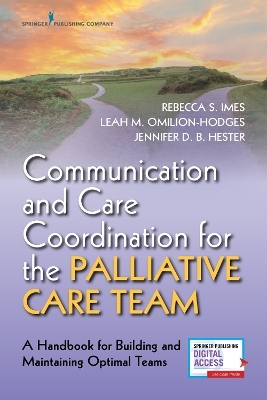
Communication and Care Coordination for the Palliative Care Team
Springer Publishing Co Inc (Verlag)
978-0-8261-5805-5 (ISBN)
Note to Readers: Publisher does not guarantee quality or access to any included digital components if book is purchased through a third-party seller.
A focus on intentional communication, team building, and relational maintenance
This text is designed to help form and maintain palliative care teams that survive and thrive. Whether you are starting a new team or hoping to help an existing team, this text addresses aspects of team players, leadership, meetings, organizational culture, and self- and team-care through a combination of empirical data and real voices from healthcare professionals in palliative care practice. By focusing on the individual professional in relation to team health and success, this text shows how to develop high-quality, high-performing palliative care teams.
Perfect for students and working professionals, this text is useful at any time in your career or your team’s development. It explores the types of providers involved in palliative care, their roles, possible conflicts, and the opportunity to amplify their work as a team while overcoming the stigma that may be attached to palliative care. This book focuses on the foundational role of communication in leadership, team building, and the delivery of patient care. Designed to provide workable solutions to challenges such as poor team design, siloing, and faulty communication, it provides suggestions that can be implemented immediately by your palliative care team. This focus allows healthcare professionals who are passionate about palliative care to grow into high-functioning teams with a focus on excellent patient care.
Key Features:Satisfactory and unsatisfactory palliative care experiences
Stories from nurses, social workers, chaplains, physicians, pharmacists, executives, patients, and families
Pearls From the Field: Provider and team takeaways
Best practices of team leaders
Tips for individuals and palliative care teams to communicate with other providers, departments, and senior leadership
Discussions on how to improve short-term and long-term functionality
Outlines to use as predictors of burnout for palliative care professionals and teams
Self-care and team-care suggestions
A combination of recent research and theory in an accessible writing style
Includes podcasts, videos, and case study and self-care plan supplements
Rebecca S. Imes, PhD (University of Iowa), is associate professor of communication at Carroll University. Leah M. Omilion-Hodges, PhD (Wayne State University), is associate professor in the School of Communication at Western Michigan University. Jennifer D. B. Hester, DNP (The Christ Hospital Health Network), is a palliative care clinical nurse specialist practicing with a high-performing transdisciplinary team at The Christ Hospital in Cincinnati, Ohio.
Foreword Andy E. Esch, MD, MBA
Preface
Acknowledgments
Palliative Care Resources
1. Why We Need to Talk About Teams and Communication in Palliative Care
2. Who Are the Players? Exploring the Types of Palliative Care Providers
3. Formation and Maintenance of High-Performing Palliative Care Teams
4. Leading Palliative Care Teams
5. Interdisciplinary Palliative Care Team Meetings
6. Occupational Culture: Understanding the Role and Stigma of Palliative Care
7. Self-Care and Team Care in Emotional Labor–Intensive Positions
Index
| Erscheinungsdatum | 01.04.2020 |
|---|---|
| Zusatzinfo | 10 Illustrations |
| Verlagsort | New York |
| Sprache | englisch |
| Maße | 152 x 229 mm |
| Themenwelt | Medizin / Pharmazie ► Medizinische Fachgebiete ► Chirurgie |
| Medizin / Pharmazie ► Medizinische Fachgebiete ► Palliativmedizin | |
| Medizin / Pharmazie ► Pflege ► Fachpflege | |
| Medizin / Pharmazie ► Pflege ► Palliativpflege / Sterbebegleitung | |
| ISBN-10 | 0-8261-5805-6 / 0826158056 |
| ISBN-13 | 978-0-8261-5805-5 / 9780826158055 |
| Zustand | Neuware |
| Haben Sie eine Frage zum Produkt? |
aus dem Bereich


